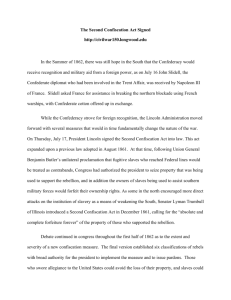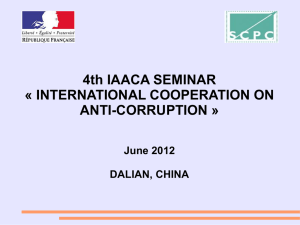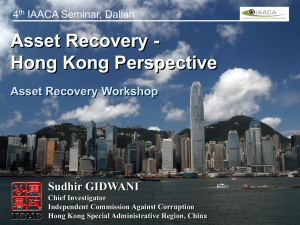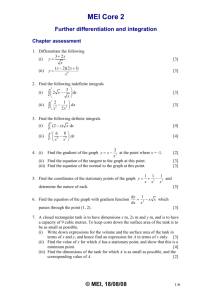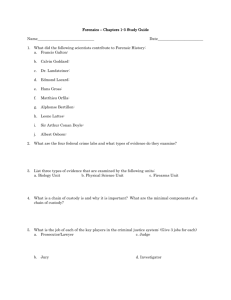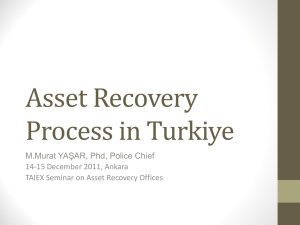PP Environmental offences may 2011
advertisement
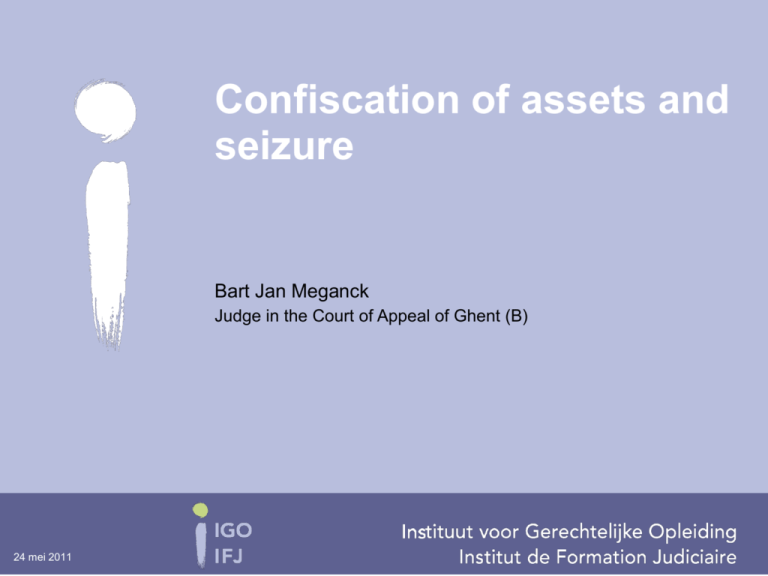
Confiscation of assets and seizure Bart Jan Meganck Judge in the Court of Appeal of Ghent (B) 24 mei 2011 I. Confiscation I.1 Historical Abuse ancient regime: all means of a person could be confiscated Belgian Constitution: confiscation (of all means) not possible Only “special confiscation”: specific goods, with legal defined relation to crimes (or countervalue from these goods) 24 mei 2011 I.2 Actual legal artice: article 42 (Belgian) Penal Code Special confiscation is applied: 1° on the things object of the crime, and those who have served or were ment to commit the crime, when they are properte of the convict 2° on the things that got on the crime 3° on the assets that are obtained directly ou of the crime, on the goods and values that substitute these assets and on the profits of the invested assets 24 mei 2011 I.3 Definition and nature special confiscation Confiscation is to define as a sanction imposed by the judge to a person in consequence of a crime, aiming to deprive, in general this person, from things or to oblige him to pay with his means a sum of money that the judge fixes as the equivalent of this things, and makes it due to the State, to instances assigned by the State or to specific persons. 24 mei 2011 I.3 Definition and nature special confiscation Main objective: deprivation, as addition of affliction (rather than transfer of assets) Only by a judge (↔ seizure: prosecutor or investigating judge, as temporary measure) No preceding seizure required; but is than more effective Is a punishment 24 mei 2011 I.3 Definition and nature special confiscation Punishment: • Additional punishment, only to impose as additional • Total amount can be divided between several convicts • Personal character: not per capita to several persons 24 mei 2011 I.4 Objectconfiscation vs. valueconfiscation Objectconfiscation: a person is deprived from the property of specific goods; property goes over to the State Confiscation by equivalent: a debt is added to the means of a convict 24 mei 2011 I.4 Objectconfiscation vs. valueconfiscation Objectconfiscation • Which thing? Every movable or immovable, material or immaterial good identifiable in means of accused • “Autonomy of criminal law”: judge must not follow civil notion of law to conclude wich things belong to means accused • “Thing”: stands in relation to the crime in a way determined by the law 24 mei 2011 I.4 Objectconfiscation vs. valueconfiscation Confiscation by equivalent • Subsidiary possibility of “confiscation” of “illegal assets” that can't be found in means of convict • Conviction to pay a certain ammount • Estimated counter-value of assets that couldn't be found in means convict 24 mei 2011 I.5 Confiscation object and instrument of the crime • Obliged when it is property of the convict • Object of the crime: on which the crime is executed • Not: the stolen, obtained or received thing 24 mei 2011 I.6 Confiscation product of the crime • According to Belgian law: the things produced by the crime (e.g. the falsification) • Not: the assets obtained by committing the crime 24 mei 2011 I.7 Confiscation illegal asset and equivalent • Art. 42, 3° (Belgian) Penal code: 3 kinds of assets: Primary Replacing Profits out of the assets 24 mei 2011 I.7 Confiscation illegal asset and equivalent Primary assets: things directly proceding from the crime (e.g. turnover illegal exploitation not permitted activity) Replacing assets: primary assets converted into other things (e.g. car bought with stolen money) Profits out the assets: e.g.: intrests illegal assets 24 mei 2011 I.7 Confiscation illegal asset and equivalent No obligation of property • Co-author for the assets obtained by another co-author E.g.: person that puts to disposal a parcel to set up an illegal advertissement-board → assets collected by person that placed the boards • Assets legal person → confiscated towards natural person liable for legal person 24 mei 2011 I.7 Confiscation illegal asset and equivalent Written demand from prosecutor required → Right to a fair trial: right of defence (art. 6.3.a ECHR) • Weakness of procedure? Specialisation prosecutors/judges in environmental (penal) law • Goods/values/any economical profit obtained committing the crime → no enrichment required • Gross calculation, without deduction of expenses: judge can limit the confiscation to net amount, though without saying it's necessary 24 mei 2011 II. Seizure II.1 Definition according Court of Cassation (B): Seizure in criminal affairs is a temporary coercive measure by which the competent authority, by the law and in consequence of a crime, withdraws a thing to the free disposal of the owner or possesor and, in the search of the truth, the confiscation, the restitution or for reasons of preservation of civil interests, and keeps this thing under her 24 mei 2011 II. Seizure II.2 Direct seizure Link between seized things and confiscation: finality seizure Preserve pieces of convince in search of truth or things that can be confiscated Indications conditions art. 42 and 43 Penal Code are sufficient 24 mei 2011 II. Seizure II.3 Seizure of value No link between seized things and confiscation required Serves to prevent fraudulent impecuniosity Paying an amount fixed by the judge In proportion to investigated crime Subsidiary: only when assets no longer found in means accused 24 mei 2011 II. Seizure II.4 Seizure-restrictions Professional secret (lawyers, advocates, doctors,...) Criminal immunity (diplomates, royals,...) 24 mei 2011
